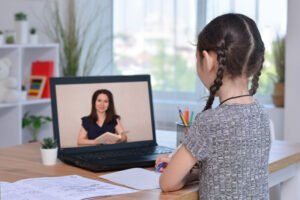Online classes are effective to contain the transmission of coronavirus but they are robbing kids from having the full school experience: interacting with others, developing connections, teamwork
By Deborah Jeanne Sergeant
 Attending school is more than learning academic subjects and physical education. For many children, it represents their main source of socializing opportunities with peers, indefinitely on hold for the pandemic.
Attending school is more than learning academic subjects and physical education. For many children, it represents their main source of socializing opportunities with peers, indefinitely on hold for the pandemic.
Even children who ordinarily home school have lost face-to-face connections with those in their home school groups, clubs, athletic teams and other social outlets as these have been shuttered or at least curtailed during the pandemic. While deemed necessary to curb the spread of coronavirus, online school presents a different dynamic to children.
They may be able to interact with teachers in real time and with each other on a limited basis, but they have lost the incidental socializing in a normal school day: chatting between classes, sharing stories over lunch, hanging out while waiting for the school bus, sitting with friends riding to and from school. These moments may seem inconsequential; however, they help children learn and develop in many ways.
For the very youngest students, “these are critical years for them to develop socialization skills,” said Robert Nazario, licensed master social worker and supervisor of school-based services for Endeavor Health Services in Buffalo and Rochester. “For kids that are just learning how to be verbal and express themselves, it’s critical in their emotional health. It’s been a set setback for them. For older kids, it’s been isolating. The pandemic has isolated them and their families and that has led to a lack of services being provided – help they may need.”
A lack of social interactions – positive, negative and neutral – means fewer opportunities for developing emotional intelligence and skills that will help children navigate relationships of all sorts. Unlike planned interactions with friends through technology (a Zoom meeting between best friends), the more spontaneous interactions in a school day (learning how to befriend an irksome classmate) tend to be more educational. Children also miss chances to develop teamwork skills.
“There’s not that natural progression of relationships and connections,” Nazario said.
He also sees the lack of in-person schooling as limited the safety net for families who need help with physical, mental, emotional and developmental needs, although wellness check-ins can help mitigate the effects.
“There are age-specific emotional milestones we want children to attain,” said pediatrician Steven Lana, with Delaware Pediatrics in Buffalo. “All people — all children — by nature are intended to be social animals. Whenever we’re isolated, we’ll suffer for that isolation. There are so many things children learn from interaction with their peer groups. When that doesn’t happen, their development is stunted.”
Since the pandemic began, all of this – and more – shifted to the digital world. Lana said that it is not an equal replacement for in-person interaction.
While those who are introverted may welcome reduced pressure to engage with others and more barriers between themselves and social interactions, that may not be beneficial for their development. And for those who thrive on socializing, stunting these interactions can feel as if they are hamstrung.
Mark O’Brien, licensed clinical social worker and Erie County’s commissioner of mental health, said that reaching out to friends virtually can help, especially for older children. Their peer groups are even more important, so they may enjoy connecting through Facetime or Zoom.
“Online stuff isn’t ideal, but it’s better than not having any contact,” he said.
These interactions let them discuss shared and differing interests and home lives and practicing their social skills. When these opportunities cannot happen, parents can help fill in some of the gaps.
Parents should stay attentive to their children’s emotional needs and watch for any signs of depression or anxiety, such as changes in eating and sleeping habits and extreme changes in behavior beyond the garden variety acting up or regression.
Luna thinks that taking time to pay attention to each child one-on-one can help mitigate the effects of fewer peer interactions.
“Plan a playdate with your children,” Luna said. “Plan on doing things that are interesting, fun and educational. It helps you bond. The silver lining is you have an opportunity to spend more time with your children and partner than would have otherwise.”
Any families in need of help can contact Endeavor Health Services at 716-895-6701.

